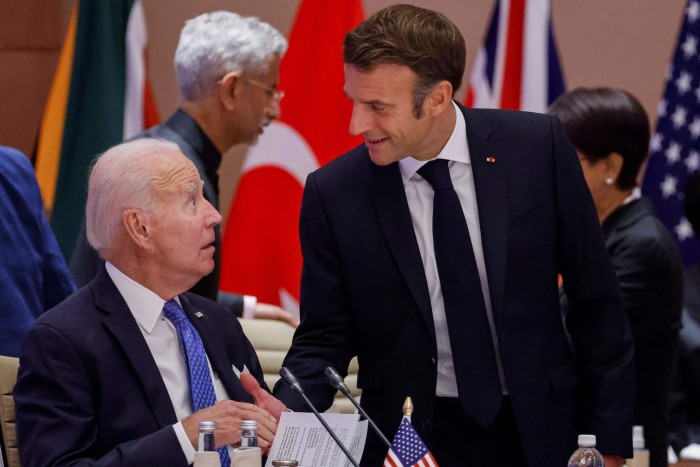It took until midnight on Friday for a handful of leading developing countries to propose their compromise. Accept it, pitched, or suffer the consequences of a broken G20.
After five days of intense debate, the Western delegation took up the treaty. When their bosses gathered for a summit in New Delhi the next day, the scale of their offer was stark.
The United States, the European Union and other Western allies agreed to lift their condemnation of Russian President Vladimir Putin’s war against Ukraine for “a legitimate purpose” in return for pledges from all 20 states, including Russia and China, to respect territorial integrity. Peace to Kiev.
“It’s a boom,” said Sarang Shidor, director of the Quincy Institute’s Global South Program.
Despite Chinese President Xi Jinping and Putin skipping the summit, the extent to which Western allies were willing to compromise underscored how keen they are to preserve the credibility of a group that has come under intense pressure for more than 18 months since Russia invaded Ukraine. Before.
“If we wrote the text ourselves, it would be very different,” said a senior EU official. “It’s a process of building global consensus. So if it’s about building compromises, that’s what . . . needs to be done.”
US officials echoed that argument. The West needed major developing countries to have any chance of pressuring Russia to control global rules and achieve peace in Ukraine.
“The world’s major economies — including Brazil, India, South Africa — are united in the need to uphold international law and Russia to respect international law,” said US Deputy National Security Adviser John Finer.
Russia’s top negotiator hailed the statement – which also calls for a return to the Black Sea grain deal for Ukrainian food exports that Moscow has withdrawn – as “balanced”. However, Ukraine condemned the change in rhetoric as “nothing to be proud of”.
While acknowledging that Putin alone cannot be persuaded to back down, the New Delhi declaration represents a far-reaching effort by Washington, Brussels and other Western capitals to create a shared position with the world’s most powerful developing economies.

It is a hugely unexpected victory for Indian Prime Minister Narendra Modi, who faces national elections next year. Analysts say Modi’s decision to turn his rotating G20 presidency into a year-long platform to promote India’s culture, foreign policy goals and ambitions to serve as leader of the so-called Global South’s developing nations has paid off.
“Washington has clearly gone the extra mile to ensure that India, its emerging and increasingly close ally, is not embarrassed by being the first G20 without a joint declaration,” Shidore said.
Since India’s G20 presidency began in December, working groups of central bankers and ministers for education, health, tourism and other sectors have been trying to break the deadlock on the final speech — the “Bali passage” — leading up to this weekend’s leaders’ summit. The G20 summit was held in Indonesia last November to condemn Russian “aggression” in Ukraine.
Russia and China vetoed the language, and many developing countries expressed their discomfort at being left out of this year’s report.
While India continued to express hope that a consensus could be found at the summit, many foreign delegates were skeptical.
“There were question marks about the future of the G20. I think India’s strong leadership has preserved the G20,” a senior EU official said.
China and others have agreed to halt attacks on infrastructure, restore the Black Sea Grain Agreement and uphold regional integrity as Western diplomats expressed a willingness to compromise on dropping references to Russian “aggression”.

India’s G20 lead negotiator Amitabh Kant said at a press conference on Sunday, “This compromise demonstrates the great ability of both the Prime Minister and India to bring together all the developing countries, all the emerging markets, all the developed countries – China, Russia, everybody. With the same schedule and consensus.
Kant said all 83 paragraphs of the leaders’ declaration were “100 percent acceptable,” including eight paragraphs on geopolitical issues. “It’s a 100 percent consensus absolute statement,” Kant said.
With the reform of multilateral banks, regulation of cryptocurrencies and improvement of the framework for debt restructuring of highly indebted countries, India was able to secure the African Union’s accession to the G20.
There was no such fanfare from China, however, which put the victory down to its delegation led by Xi Jinping’s second-in-command, Premier Li Keqiang. Beneath the big headline about Xi on developments in China’s northeast, the official government news agency Xinhua published only a brief report on the G20.
French President Emmanuel Macron also sought to play down the compromise in the statement, saying the G20 was “not an arena for political discussions”.
“We are here to talk mainly about economic topics and climate change,” Macron told reporters after the summit. “Of course we disagree on Ukraine because Russia is a member of the G20. This is not the main place to be resolved,” he said.
However, other Western representatives said this weekend’s reconciliation would help their efforts to persuade developing countries to pressure Moscow to end the war. Their negotiating partners will now go to their capitals with pledges to protect Ukraine’s territory and infrastructure in mind.
“This is not the end of the debate,” the senior EU official added. “But this is another step in the right direction.”
Next year the G20 summit will be held in Brazil. Its president, Luiz Inacio Lula da Silva, waded into the controversy late Saturday, saying that Putin could travel to Rio de Janeiro without fear of reprisal, despite being subject to an international arrest warrant.
“What I can tell you is that if I were the president of Brazil and he went to Brazil there was no way he would be arrested,” Lula, who has repeatedly accused the US and EU of “promoting” the war in Ukraine, told locals. Media in India.
Additional reporting by Joe Leahy in Beijing and Brian Harris in Sao Paulo
